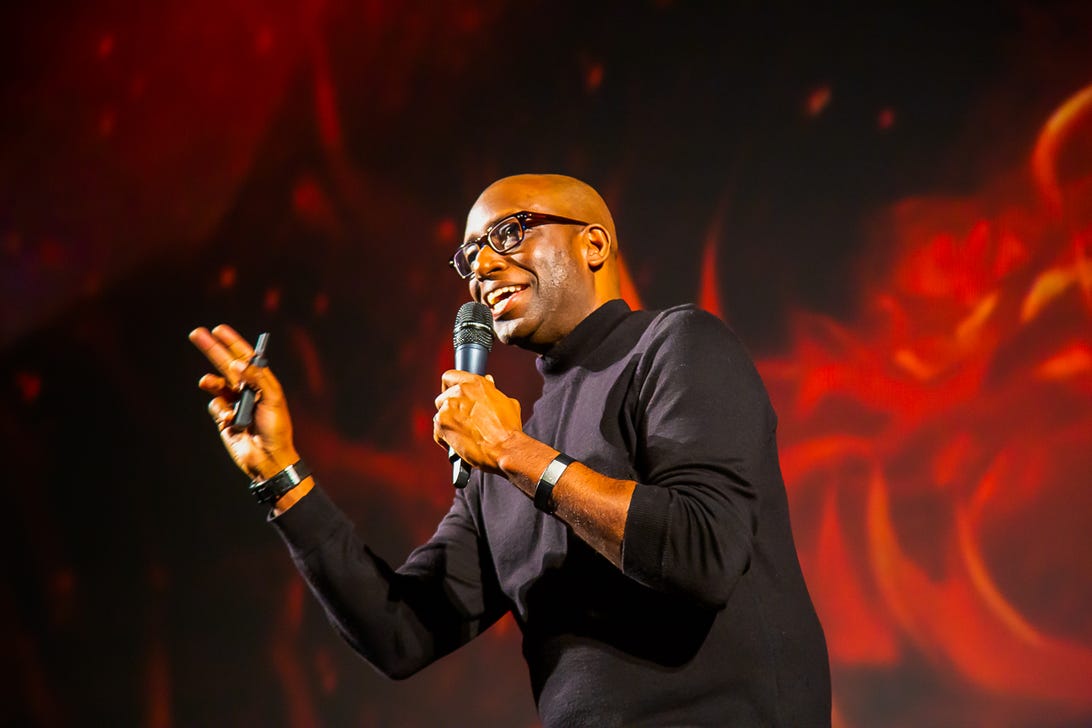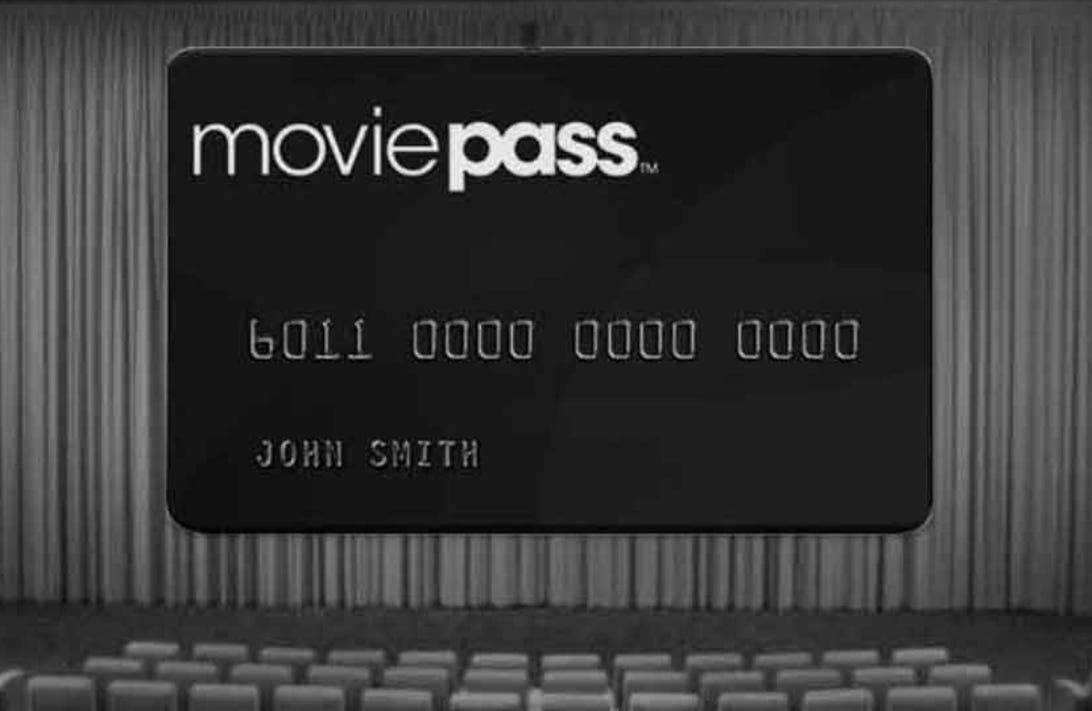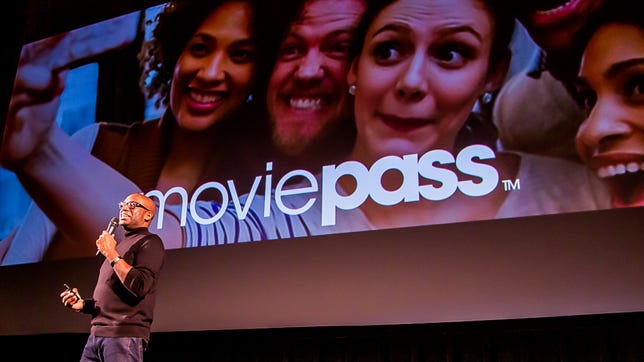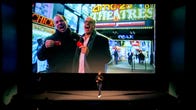
MoviePass CEO Stacy Spikes during the MoviePass 2.0 reveal event.
Lawrence M. Miner Jr./MoviePassThings didn’t work out so well for MoviePass in its first incarnation, with its “all you can watch” model leading to the demise of the movie ticket service in 2019. Co-founder Stacy Spikes was gone at that point, fired the previous year by MoviePass’ then-owner, but now he’s back. Spikes bought the service in November in a bankruptcy auction, and he’s got a new vision for where it goes from here.
Last week, Spikes gave a presentation teasing MoviePass’ next life, including a credits system for purchasing movie tickets. Spikes, now the company CEO, spoke with CNET after that event to share more details about the service, which is slated to launch this summer.
He elaborated on PreShow, the optional advertising program that uses face detection to verify if an ad is watched before awarding credits. PreShow isn’t planned for this summer’s launch, but is part of an overall plan to make MoviePass into a marketplace where theaters and advertisers can offer incentives directly to customers, according to Spikes. He also said that the returning MoviePass credit card could eventually be replaced with Apple Pay or Google Pay contactless payment methods, that he’s eying the metaverse for opportunities and that he hopes his return to MoviePass could help encourage young Black and brown kids find their way as entrepreneurs and at startups.
The conversation has been lightly edited for clarity.
You led off the presentation making a strong point for encouraging Black and brown kids that they, too, can get into the entrepreneur and startup space, especially noting how you and your original co-founder were ultimately pushed out of MoviePass. Can you elaborate about planning that into your presentation and about challenges minorities and women face?
Spikes: Venture capital is still rather young, and it’s very akin to the early days of sports in America where minorities didn’t get the same opportunities to be able to play, and you are seeing some of us start to break the color lines more often. I think it’s really important for people to be able to see people on that stage swinging at the fences for the big opportunities. It’s a very big problem, it’s one that I think people are starting to address more and more, but I don’t think too many people have had the opportunity to be able to talk about it.
If there is a silver lining to all of this, this opportunity to come back, it’s to be able to address that. Hopefully it helps change the lexicon a little bit for people. I had a lot of down time to think, and I went back and I read Muhammad Ali’s autobiography, I looked at what Billie Jean King, Venus and Serena, and a lot of sport athletes had to go through when they were the first starting to break through certain areas and they had to deal with certain things where they needed to shine a spotlight on the imbalance of things. It was just an important point that if nothing else happened and I completely bombed up there, I wanted to make sure I got that point out first and foremost.
When we last spoke in November, you were essentially on a listening tour, and in your February event you came back with input from theaters and input from former subscribers. When it comes to theater partners, are you finding most of the prior ones are rejoining right away or is that ongoing?
I think everybody was more open, there was a proof point that subscription is part of the landscape, so that’s one piece that’s present. We clearly have COVID and we’re coming out of that, so you add that factor. And then you have a willingness on our part to change the model a bit that gives them a bit more interaction with the consumer to be able to play. That was a big thing we heard, they wanted to feel some part of that relationship they got to engage in.
So all the conversations are going very well. The issue right when we get into November, everyone gets really busy because of the holidays, and not until mid-January that you start to be able to talk to them again. We’re having really good conversations, and my hope is the next stop is to unveil some of those partnerships.
MoviePass itself is moving to a credits system, which looks like a parallel to ClassPass and similar models where you pay for a tier that comes with credits. How did you land on that initial model, and is it right to presume that unless you pay for enough credits, it’s probably not going to translate to a movie a day?
We wanted to place flexibility in the system over the simplicity that we had with the all-you-can-eat model. The all-you-can-eat model has some drawbacks to it. I think if the whole movie ecosystem all had agreed on a subscription price and everyone was on one system, that’s easy, but when you have different exhibitors at different price points doing different things, we needed something that just has some flexibility built into it. That’s a step in the direction that you want to be able to do that.
You can in theory have a credit system that says, here’s 30 credits and every movie is a single credit. You can still do that, but just starting to move in that direction gives us some wiggle room that everyone can start to actually play in a real marketplace.
A theater that really wants your business and finds you valuable can treat you differently than a theater that isn’t trying to come after you and get you as a consumer. The flexibility is more the importance here. Of course, you can set the tiers in a way that you have that so it’s about creating that capability.


MoviePass credit cards are coming back, and so are theater partnerships.
MoviePassAnd the credit card system is coming back. Are there any updates you are ready to discuss regarding that?
That system we all kind of know. At some point with Apple Pay and other electronic payment systems. To be honest, I do think there will be a sunsetting of the card at some point. But that has to do with how fast theaters are integrated, that you’re just plugged into the API. A lot of people have moved into contactless transactions. We are talking to the theaters to find out what percentage of the marketplace is up to contactless. But our goal is to get everybody there and that you don’t actually need the card. In order to give you that go-anywhere feeling, the card will probably start out.
That would be very convenient if so.
The version that we’re testing right now, that’s what we’re doing. We haven’t printed any cards, but the theaters that we are doing that at, we can do that. But [some] theaters just didn’t have the funding to go upgrade those systems over the COVID period, so we’re working with them and willing to figure it out. The technology is already there, but we don’t want to have exhibitors come up with the costs to get up to that level or take away from the opportunity for them to be in the system right now.
I found it interesting that PreShow as an advertising platform was given a good chunk of the spotlight. It’s not a surprise that MoviePass is going to have data and advertising models built into it, but the service received backlash for discussing location tracking back in 2018. How did you go about strategizing PreShow’s introduction, including the possibility that the face detection feature could create an initial reaction from the consumer side?
We went through 2018 and once we got to real consumers, we found it was more the press, there were some snarky headlines and the Clockwork Orange, most of that was not consumer-related. What we wanted to do, again building a marketplace, was say to those brands that are trying to get in front of those consumers, here’s an opportunity to do that. But they want to know the person didn’t just set the phone down and walk away — 70% of digital advertising today goes unseen. What we said was, let’s make it a fair exchange and just be up front about that. I think the worst thing — and you can see a lot of companies are starting to step back from, and I was very clear about third-person data and taking your data and selling it — those companies have started to walk that back. The whole cookie universe is walking back.
We think we’re actually ahead of the trend just being up front in the conversation. We’re going to create a marketplace that if I want to see James Bond for less credits and you give that as an option to watch the Land Rover presentation, sure, not only would I probably watch it anyway, but great, I can get some extra credits for that. We wanted to put it out there that that’s something coming, it’s not something that will be there in the summer, but it is the pathway that we wanted to create a true marketplace that advertisers can also play in. They’re already spending a lot of money around movies, so we think it’s important to keep that part of the ecosystem because it’s already there. My phone unlocks using my face, my iPad unlocks using my face. I use it on all of my Apple devices, it’s seamless. We just didn’t want to be behind the eight ball with someone saying, “Ooh, you know what they’re doing.” We wanted to be first to put that out there.


Spikes introduced PreShow at the MoviePass 2.0 event.
Lawrence M. Miner Jr./MoviePassIn a way, it’s not new. Spotify lets you opt to listen to longer ads in exchange for more ad-free listening time.
It’s totally optional. It sits to the side, and you don’t have to do it at all. That’s the beauty of it. If you want to pay more, pay more. If you want less [there’s] an opportunity to engage with [it]. Some of us who are movie lovers and we go, when you get to see behind the scenes, if you ever saw the Land Rover piece, they were showing the stunt vehicles in James Bond and the vehicles flipping over. Those things are really fun to watch.
I remember the last Mission: Impossible where they showed Tom Cruise flying the helicopter, and that’s a specific Bell helicopter, they show how the helicopter has the ability to make turns and rotations. All of that is an active part of the moviegoing experience. The preshow, the pre-engagement, is part of that. We just think it’s actually going to be fun, and why not get some credits along the way.
Turning toward the app, what was the process to get your original engineering team back? And with the app itself, is it a rebuild from scratch or were you able to take the previous app and build up from there?
The engineering team, we’ve been working together a long time. A bunch of them, once MoviePass went down, came over and started working on PreShow. They were on PreShow already, and then when we got MoviePass, it’s all back in the family.
We took the app where it is, a lot of the functionality is there. But the marketplace concepts of where we’re going, we realized you really need a lot of the Web3 technologies to give it that full robustness that you want. That’s all part of the new building structure, and some of the investing partnerships that we’re talking to have NFT and blockchain technology interests and that kind of decentralization, of returning the power back to the consumer, in helping them be in charge of their own. That’s really everyone has a similar vision of the future. We have a very distinct view of how we can use that in the marketplace.
We are already looking at some of the metaverse pieces, over the last 12 months even before we got MoviePass back. We’re excited about that as well. I think there’s a lot of potential there.
My colleague found that the most recent Samsung metaverse event didn’t actually have enough Samsung, becoming more of a clothing quest. It seems like we’re in a weird spot figuring out what consumer interaction is in the metaverse space right now.
We have some specific ideas based on movie platforms that are in there. We think there’s a really good place where MoviePass would fit in there. We look at cinema as a live portion of the movie industry. When we see a Justin Bieber concert in the real world and a Justin Bieber concert in the metaverse, how do you make those things work together? That’s the part we are looking at because the experience — probably the best one if no one has ever done it is go into Oculus and watch Ghost in the Shell in there. There’s things you can do, but depending on the platform you are looking at it on, there’s different experiences. We think you can tie it in the theater experience.
We have a saying that cinema is adventure and adventure should not come with a pause button. We don’t want you to sit and pause. There may be something where if showtime is at eight, it’s the same way we used to tune into a radio concert that was live. You knew this was an event that’s happening. There’s some nice things we are seeing correlations with that we’re starting to tap into, but we’re well down the road with that as well.
And you are giving fans the opportunity to invest into MoviePass, which is not currently a public company, but mentioning there will be benefits to that for those that choose to jump in. Are there any details on that you can elaborate on?
When you do something like Kickstarter, what’s traditionally happened is you preorder a product. I’m going to use skateboards as an example, so let’s say I do a Kickstarter for skateboards and every skateboard is $100. When it comes up, you are going to give [the customer] a skateboard. The person doesn’t own a piece of the company, they own a skateboard.
There’s a filing of “Reg A” where you’re able to actually allow consumers to own stock in a company, so that’s different than what you traditionally see. It’s like a pre-public event. There will be far more details up on the website — it’s actually in the filing process — once it’s approved. That way people can actually own, and you can own it so much earlier than [when] the VCs are going to come in. It allows you to do that so much earlier in the process but at a much cheaper price. We wanted to kind of give back to our fanbase in that way and give them early access to something that hopefully we all do together, which will create value.


